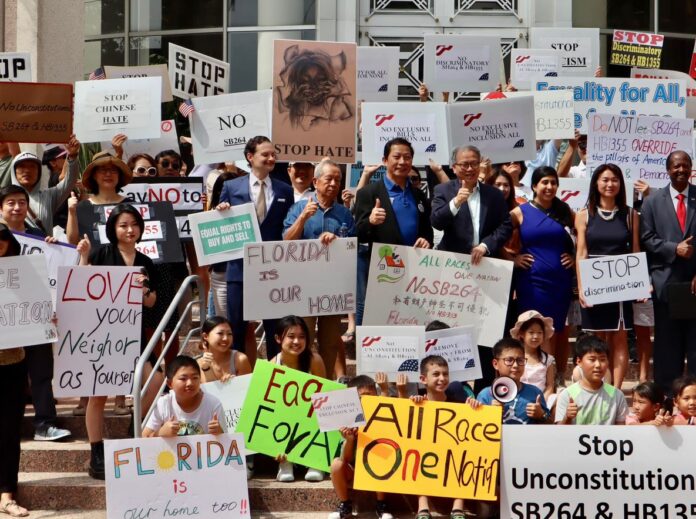By Bethany Li and Thông Phan
For Asian Americans around the country, all eyes are on Florida this week.
On Friday at the U.S. Court of Appeals for the Eleventh Circuit in Miami, counsel representing four Chinese immigrants will argue against SB 264, a Florida law banning many Chinese immigrants from buying a home in large swaths of the state.
Next door in Georgia, legislators have passed a bill, which restricts the sale of agricultural land
to so-called “agents” of China.
Other state legislatures have pushed through similar laws that target primarily Chinese people all under the guise of national security. This new round of laws restricting Asians from owning land played out more than 100 years ago already in the form of “alien land laws.” So for us, the oral arguments in Florida later this week will represent a larger conversation of who this country is for and what our place is here.
While the COVID-19 pandemic of 2020 is often cited as the cause of the recent wave of violence against Asian Americans, for the Asian American Legal Defense and Education Fund, co-counsel on this case, the pandemic was just the latest and most prominent catalyst for longstanding anti-Asian animus.
Tellingly, the gunman in the 2021 spa shootings in Atlanta who primarily targeted Asian women cited an entirely different reason for his violence — he blamed Asian women for his self-described sex
addiction. Asian Americans Advancing Justice-Atlanta, a nonprofit that advocates for Asian Americans and immigrants in the South, similarly holds that whether it’s the pandemic, misogyny, or alleged concerns over national security, it is Asians who endure the backlash.
These bills primarily target Chinese immigrants, but we’ve repeatedly seen examples throughout Asian
American history that discrimination casts a wide net. After 9/11, it wasn’t just Muslims or people of Middle Eastern descent who were targeted with violence. South Asians and even Sikhs experienced a significant share of discrimination and harassment. The authors of this op-ed are Chinese American
and Vietnamese American, respectively, and both of us have experiences where our nationality and right to be here have been questioned. We have both experienced being treated as the other—as foreign, and suspect.
Alien land laws are as antiquated as the term “alien” itself. They go as far back as 1859, when Oregon amended its own constitution to explicitly exclude any “Chinaman” from owning property in the state.
The bills in Florida and Georgia attempt to avoid any labeling of being anti-Chinese by including other
countries as well. But Governor DeSantis made clear when he was signing the Florida bill that this was about China, and it is Chinese immigrants who are singled out for the most extreme
restrictions and criminal penalties.
Although the Georgia bill technically applies to “agents” of certain governments who could be of any
nationality, legislators also made it a point to clarify that China and Chinese nationals are the intended target. Thus, we know it is Chinese people and other Asians who will be most susceptible to harassment and discrimination due to an unfounded suspicion perpetuated by these laws. For Asian immigrants who came to this country, SB 264 in Florida and SB 420 in Georgia send a message that they
do not belong here and America will never be their home.
The Court has the power to stop Florida’s SB264 by issuing a ruling that the draconian and antiquated state law conflicts with federal law and that it likely violates equal protection, fair housing laws, and due process. And Georgia’s governor can prevent constitutional violations by vetoing SB 420. But more importantly, such actions by those in power would send a message to other state legislatures attempting to enshrine racism and xenophobia into their legal codes that these laws were
wrong then, and they’re wrong now.
Whether it is Chinese immigrants today or another ethnic or racial group tomorrow that are targeted and scapegoated, we will not tolerate any form of oppression and racism, no matter what guise
lawmakers may hide behind.
Bethany Li is the legal director of the Asian American Legal Defense and Education Fund (AALDEF), a civil rights organization that has been fighting for the rights of Asian American communities around the country since its founding fifty years ago in 1974. AALDEF is co-counsel alongside the American Civil Liberties Union, ACLU of Florida, DeHeng Law Office, and the law firm Quinn Emanuel in the Shen v. Simpson case against SB 264, a Florida law banning many Chinese immigrants from buying homes in large swaths of the state.
Thông Phan (first name pronounced as Tom) is a Senior Policy Associate at Asian Americans Advancing Justice-Atlanta, which is the first and largest nonprofit legal advocacy organization dedicated to protecting the civil rights of Asian Americans, Native Hawaiian, Pacific Islander (AANHPI) and Arab,
Middle Eastern, Muslim, and South Asian (AMEMSA) communities in Georgia and the Southeast.


